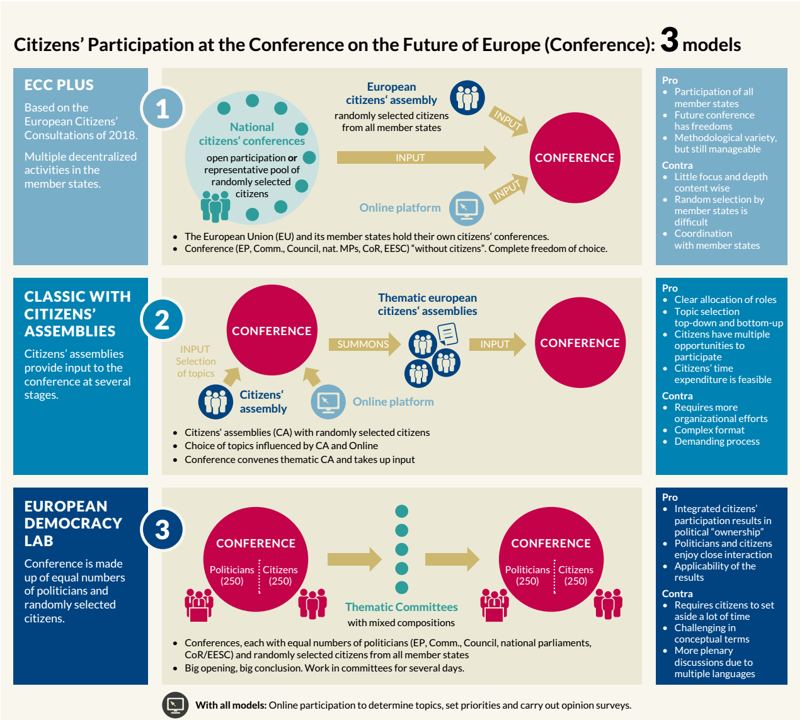Policy Brief: Future of Democracy (pdf)

my notes ( ? )
to make participatory democracy a reality, it is essential to avoid only paying lip-service to the idea of participation — and give citizens a real say...
European federalists are hoping to gain momentum for treaty change. Many member states are afraid of that very outcome...
Citizens’ participation is being tested out far more commonly across Europe... The EU has taken initial steps ... often a gap between expectations and reality...
Done well, citizens’ participation increases people’s trust in democracy and improves policies... done poorly, citizens’ participation damages European democracy... not simply a communication exercise, but... a change in the culture of the EU institutions.
This policy brief discusses the principles and success factors of good participation, and highlights three possible models... citizens’ participation is often understood in very different ways. Some politicians ... only as ... communicating with citizens...
Information, dialogue, consultation, a stake in decisionmaking, decision implementation ... the steps on the participation ladder... Are citizens being consulted or are they directly involved... is the core question ...
The question of topics therefore comes down to designing the process in the right way and working out how to involve experts...
Weighted random selection offers ... Citizens with quite diverse experiences, interests, opinions and perspectives... even those who do not participate ascribe great legitimacy to such assemblies...
French Grand Débat exemplifies the interplay between online and offline spaces ... number of challenges... online ... for information, transparency and broad participation... only at the physical events that people come together for a more complex debate...
for #CoFoE ... A virtual discussion in which several million people take part across the EU, combined with the physical involvement of citizens... snowball ... further debates. Ideas could be collected online and categorized. In face to face meetings, these concrete proposals from citizens could then be developed further...
Transnational, multilingual dialogues are more difficult... models ... that allow linguistic diversity ... small groups or “world café”. ... process facilitators familiar with ... participatory formats... Citizens’ participation on complex issues only works when experts are involved... different participatory processes connect ... a coherent picture ... to outsiders... how each building block contributes...
various scenarios emerge ... Three idealtype models ... can also be combined.
1.) European Citizens’ Consultations Plus (ECC plus): ... national citizens’ conferences ... can be a combination ... smaller regional gatherings... open to anyone interested or randomly selected ... In addition ... EU level Citizens’ Assembly with participants from all member states, as well as an online platform...
2.) The Classic with Citizens’ Assemblies:... the “usual players”... [plus] randomly selected Europeans ... important role ... Before ... European Citizens’ Assembly ... discusses which issues are relevant .... [plus] online discussion... then considered by the conference.... later ... thematic Citizens’ Assemblies at a transnational level... flow back into the conference.
3.) European Democracy Lab: ... truly new territory ... based on the first Constitutional Convention in Ireland in 2015... equal parts of representatives of politics (European Parliament, Commission, member states) and citizens ... not only plenary sessions, but also... thematic committees ...
In all variations, there can and should be a strong online component ...
When participants ... feel that they are being instrumentalized, their commitment turns into resistance. “Democracy washing” should not be in anyone’s interest... ... isolated experiments with participation at the EU level ... detached from the institutional context should be avoided. Citizens’ participation is not purely an exercise in communication but an attempt to initiate a general cultural change in European politics and the EU institutions.
Read the Full Post
The above notes were curated from the full post www.bertelsmann-stiftung.de/fileadmin/files/BSt/Publikationen/GrauePublikationen/ZD_Einwurf_4_2019_EN_Conference_Talk.pdf.Related reading
More Stuff I Like
More Stuff tagged cofoe , trust , multilingualism , participation , eu , democracy
See also: Communication Strategy , Content Strategy , Online Strategy , Online Community Management , Social Media Strategy , Social Web , Politics , Communications Strategy